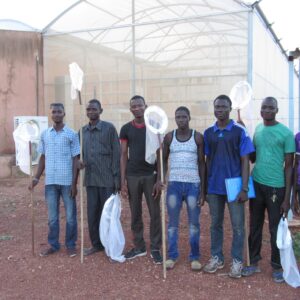Medical Entomology

DR SIMON P SAWADOGO
Dr Simon P Sawadogo is the Head of the Department of Medical Entomology at the Sya Innovation Center (SIC). His research focuses on mosquito mating system to develop vector-control strategies. He is working under the leadership of the SIC Executive Director and has pioneered research on mosquito mating over the last 15 years. His team has published several papers considered as landmarks that brought fresh insights into mosquito mating and raised hope that knowledge on mosquito mating today can be used to cut down the high reproductive rate of malaria vectors. For instance, his team recently demonstrated that the resulting mass-killing of swarming males and some mate-seeking females resulted in a dramatic 80% decrease in population size compared to a control population. The team is currently implementing a videography system to track swarming mosquitoes in semi-field and field conditions to directly support the development of malaria-vector control strategies/methods, such as gene-drive, acoustic lures, and monitoring.
Our Department Medical Entomology
The department of Medical Entomology aims to contribute to the development of control strategies to decrease the incidence of vector-borne diseases. In order to achieve this, our research focuses on understanding the biology and ecology of vectors, as well as the molecular and biochemical mechanisms associated with vector competence and resistance to insecticides. The studies conducted in this area include vectors which transmit, malaria and arboviral diseases (dengue, chikungunya, Zika, yellow fever, Rift Valley fever, …)
Research Activities
- Assessing insecticide resistance among vector populations with the goal of advising public health entities regarding appropriate insecticide use.
- Assessing the efficacy and effectiveness, both in the lab and the field, of vector control products.
- Identifying genes structurally and functionally involved in the vector-pathogen interaction with the goal of defining novel strategies for transmission control.
- Understanding the ecological factors associated with vector-transmitted diseases.
- Designing and assessing new strategies for vector control based on the knowledge of the vectors themselves.
- Studying mosquitoes swarming and mating behavior
- Exploring mating system in anopheline mosquitoes in order to provide useful data in predicting the sexual interaction between natural populations of gambiae and sterile or genetically modified mosquito’s species expected to be used in malaria new vector control strategies and will seek ways to cut down the reproductive rate of mosquitoes by males swarms killing or trapping.
- Understanding the complex dynamics of mating swarms using an interdisciplinary approach by combining expertise from neuroscience, bio(fluid)mechanics, machine vision, behavioral ecology to generate a new understanding of the functional neuro-mechanics of mating swarms, and to provide crucial knowledge about the mechanisms that underlie the fecundity of malaria-vectors.
- Assessing the effectiveness of larval predation as an alternative tool for mosquito population control
- Testing multiple approaches for vector control and test their usefulness for application, efficiency and social acceptance.
- Developing of vector surveillance tools and strategies for prevention and control of vector borne diseases
- Providing technical assistance for development of strategy for effective transmission prevention or control vector abundance.
- Organising training workshops on malaria and dengue vector identification and surveillance to health workers at different levels
- Assessing the effectiveness of larval predation as an alternative tool for mosquito population control
Active Projects
No active projects



